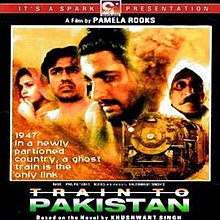Train to Pakistan (film)
| Train to Pakistan | |
|---|---|
 | |
| Directed by | Pamela Rooks |
| Screenplay by | Pamela Rooks |
| Based on | Train to Pakistan by Khushwant Singh |
| Produced by | R. V. Pandit Ravi Gupta Bobby Bedi |
| Starring | Nirmal Pandey Rajit Kapur Mohan Agashe Smriti Mishra |
| Cinematography | Sunny Joseph |
| Edited by | A. V. Narayana Sujata Narula |
| Music by | Piyush Kanojia Taufiq Qureshi Kuldeep Singh |
Release date |
|
Running time | 108 minutes |
| Country | India |
| Language | Hindi |
Train to Pakistan is a 1998 Indian
Hindi film adapted from Khushwant Singh's 1956 classic novel by the same name set in the Partition of India of 1947 and directed by Pamela Rooks.[1] The film stars Nirmal Pandey, Rajit Kapur, Mohan Agashe, Smriti Mishra, Mangal Dhillon and Divya Dutta
.
Plot
The film is set in Mano Majra, which is a quiet fictional village on the border of
Muslims, who live in harmony. The Sikhs own most of the land, and the Muslims work as labourers. During the summer of 1947, when the Partition of India was taking place, the entire country was a hotbed of extremism and intolerance. The Muslims in India moved towards the newly formed Pakistan, and the Hindus and Sikhs in Pakistan migrated to refugee camps in India. One day, a train arrives from Pakistan, which carries bodies of all the Sikh and Hindu children, Women and Men who have been butchered while they tried to depart from Pakistan. That is when this quiet village is changed forever.[1]
Cast
- Mohan Agashe as Hukum Chand
- Nirmal Pandey as Jaggat Singh, Jagaa
- Rajit Kapooras Iqbal
- Smriti Mishra as Nooran
- Divya Dutta as Haseena, the Muslim prostitute girl
- Mangal Dhillon as the sub-inspector
Development
The film was one of the most anticipated adaptations of its time, especially being writer Khushwant Singh's most acclaimed work. According to him, several people in past have attempted to make the film, including Shashi Kapoor and Shabana Azmi, who even developed a screenplay, but owing to the sensitivity of the subject, they abandoned the project.[3]
Pamela Rooks first read the novel at 17, preparing for the title role of Nooran, which she was set to play in the prospective
National Film Award for Best First Film of a Director. For her adaptation, Rooks chose a slightly different narrative from the original novel. Thus the film begins with Hukum Chand, the District Magistrate, reminiscing about the partition period. However, she has visually translated most of the lines from Khushwant Singh's narrative directly on to the screen.[4]
Production
The film was produced by
Indo-Pak border, where the novel was set. Pamela used her background in the documentary film, making to shoot certain parts of the film live, in scenes like that of religious ceremony at a temple, the feel couldn't have been recreated though retakes were shot live. The shooting was finally completed by July 1997, when the film went into post-production work in Mumbai, ahead of its 15 August, television premiere on STAR Plus.[4]
Release and critical reception
Initially, the film was to have its premiere on
Cinequest Film Festival.[8]
References
- ^ a b "Films & Partition train of History". The Tribune. 5 August 2007.
- ISBN 81-260-1221-8.
- ^ a b "No malice towards Rooks: Khushwant". Indian Express. 10 January 1999.[permanent dead link]
- ^ a b "Fifty summers after". Indian Express. 25 July 1997.[permanent dead link]
- ^ Company Credits IMDb.
- ^ "Pamela Rooks". Outlook (magazine). 19 January 1998.
- ^ Train to Pakistan NFDC
- ^ Awards IMDb.
External links
- Train to Pakistan at IMDb
